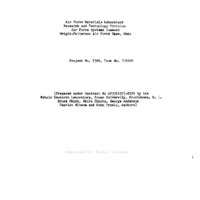-
Title
-
Ultrasonic Methods In The Study Of Deformation In Single Crystals
-
Date
-
1964
-
Index Abstract
-
Not Available
-
Photo Quality
-
Not Needed
-
Report Number
-
ML TDR 64-34
-
Creator
-
Hikata, Akira
-
Anderson, George
-
Elbaum, Charles
-
Truell, Rohn
-
Corporate Author
-
Brown Univ Providence RI Metals Research Lab
-
Laboratory
-
Air Force Materials Laboratory
-
Extent
-
54
-
Identifier
-
AD0606759
-
Access Rights
-
OTS
-
Distribution Classification
-
1
-
Contract
-
AF 33(657-8324
-
DoD Project
-
7360
-
DoD Task
-
736002
-
DTIC Record Exists
-
No
-
Distribution Change Authority Correspondence
-
None
-
Distribution Conflict
-
No
-
Abstract
-
The purpose of the investigation was that of understanding the physical changes which occur in aluminum and in certain ionic crystals during and after deformation. The investigation involved the study of imperfection behavior generally, and specifically the interaction of point defects with moving and vibrating dislocations, as well as the contribution of dislocations to the anharmonic characteristics of solids.In the past year a hitherto unreported contribution of dislocations to the anharmonic behavior of solids was found. This effect was explained in terms of dislocation loop characteristics, in the prescence of an external static stress combined with an ultrasonic stress. Experiments on this effect were carried out as a function of static stress, dislocation loop length, crystallographic orientation, plastic deformation and ultrasonic stress amplitude. The results of these experiments are consistent with the proposed theory.Experiments were carried out on the relation between changes of electrical conductivity and ultrasonic attenuation in alkali halides. The effects of plastic deformation and of temperature on this relation were studied. A different time dependence at a given temperature was found for the conductivity change and for the attenuation change following plastic deformation. This difference is interpreted in terms of dependence of conductivity changes on the consideration of point defects in the lattice and on the dependence of the attenuation change on the number of point defects reacting with dislocations.Preliminary experiments were conducted on the temperature dependence of the magnitude and sign of the surface charge developed in alkali halides. The difference of potential between two surfaces of a specimen, maintained at different temperatures, was measured as a function of the temperature difference and of the average temperature. The results were studied in terms of charge distribution associated with thermal an chemical diffusion currents.Experiments were carried out on the recovery of ultrasonic attenuation following plastic deformation and as a function of plastic strain. The recovery theory which predicts a dependence of attenuation on the 2/3 power of time was extended to include the case of overdamped dislocation vibrations. A mechanism for attenuation recovery which takes into account point defect migration to the dislocations, followed by the escape of these defects to sinks along the dislocations was considered in some detail.An Automatic Recording Time Measurement Unit (ARTMU) has been developed as an aid in obtaining rapidly changing velocity data during dynamic experiments. The unit has a time resolution of 1 part in 2 x 10^5 and is useable at any ultrasonic frequency where two or more high stability echoes are available from the particular sample under investigation.
-
Report Availability
-
Full text available
-
Date Issued
-
1964-03
-
Provenance
-
Lockheed Martin Missiles & Fire Control
-
Type
-
report
-
Format
-
1 online resource
 MLTDR64-034.pdf
MLTDR64-034.pdf